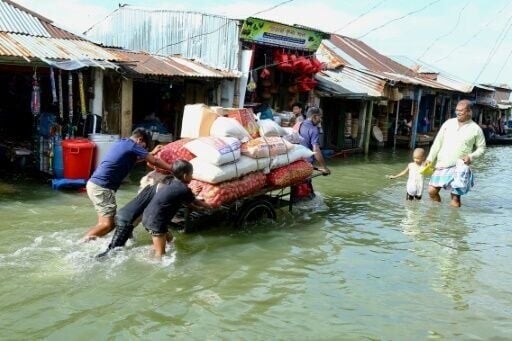In a tragic turn of events, the death toll from the devastating floods in Bangladesh has risen to eight, leaving more than two million people affected by the aftermath of heavy rains that caused major rivers to overflow, officials confirmed on Saturday. The South Asian nation, home to 170 million people and crisscrossed by hundreds of rivers, has been grappling with more frequent floods in recent decades, a trend exacerbated by the impacts of climate change.
Climate change has been identified as a key factor behind the erratic rainfall patterns and melting glaciers upstream in the Himalayan mountains, leading to increased instances of flooding in countries like Bangladesh. The situation highlights the urgent need for global efforts to address climate change and its far-reaching consequences on vulnerable communities worldwide.
Tragedy struck when two teenage boys lost their lives as a boat they were on capsized in the floodwaters, underscoring the dangerous conditions faced by residents in flood-affected areas. The rising death toll and widespread displacement serve as a stark reminder of the immediate and long-term challenges posed by natural disasters exacerbated by climate change.
In response to the crisis, authorities and humanitarian organizations are working tirelessly to provide relief, support, and assistance to those affected by the floods. Efforts to improve infrastructure, disaster preparedness, and response strategies are crucial in mitigating the impact of such calamities and ensuring the safety and well-being of communities at risk.
Climate change has been identified as a key factor behind the erratic rainfall patterns and melting glaciers upstream in the Himalayan mountains, leading to increased instances of flooding in countries like Bangladesh. The situation highlights the urgent need for global efforts to address climate change and its far-reaching consequences on vulnerable communities worldwide.
Tragedy struck when two teenage boys lost their lives as a boat they were on capsized in the floodwaters, underscoring the dangerous conditions faced by residents in flood-affected areas. The rising death toll and widespread displacement serve as a stark reminder of the immediate and long-term challenges posed by natural disasters exacerbated by climate change.
In response to the crisis, authorities and humanitarian organizations are working tirelessly to provide relief, support, and assistance to those affected by the floods. Efforts to improve infrastructure, disaster preparedness, and response strategies are crucial in mitigating the impact of such calamities and ensuring the safety and well-being of communities at risk.


















